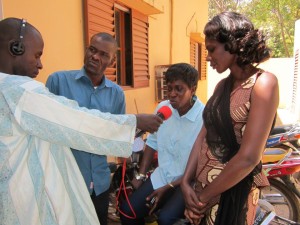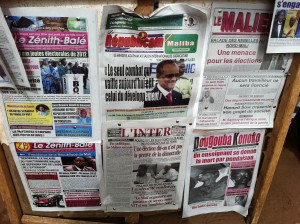Training Malian journalists during tense political times
 The DW-AKADEMIE workshop on election reporting in Bamako is taking place during a time of real political uncertainty in Mali. Already there had been questions about whether the government was adequately prepared to hold the elections. And then in January, Tuareg rebels started attacking towns in northern Mali and that conflict has been going on ever since.
The DW-AKADEMIE workshop on election reporting in Bamako is taking place during a time of real political uncertainty in Mali. Already there had been questions about whether the government was adequately prepared to hold the elections. And then in January, Tuareg rebels started attacking towns in northern Mali and that conflict has been going on ever since.
The first round of the presidential elections is scheduled for 29 April – about six weeks from now. But Mali doesn’t feel in full election mode yet. With all the potential problems that might arise people are wondering whether the elections will be held on the scheduled day. Political parties aren’t campaigning as aggressively as you might expect. People aren’t discussing the elections with as much passion as usual.
 Just as the workshop started, rebel fighters won a major victory, taking control of Tessalit and its military base – the only large military base Mali has in the far north of the country.
Just as the workshop started, rebel fighters won a major victory, taking control of Tessalit and its military base – the only large military base Mali has in the far north of the country.
The fighting in the north affected one of our participants more directly. The rebels ransacked his radio station in the town of Menaka. Much of the equipment there was either damaged or stolen.
Listening to the people’s voice
The issue of the rebellion has of course come up a number of times during the workshop’s sessions. One of the groups did a vox-pop about how the crisis in the North could affect the elections. Most of the people interviewed were very worried that the fighting could disrupt the electoral process.
How is the crisis in the north of Mali going to affect the presidential elections? Listen to the vox-pop! (in French)
In general we found that the participants reflect a streak that runs through Malian journalism – namely that journalists let their agenda be dictated to them by politicians and NGOs rather than taking the concerns of everyday people as their inspiration.
Another group of participants found during their vox-pop exercise that most people wanted to talk about food prices when asked about the political issue that interests them most. Probably most of the participants already knew this was the major concern of most Malians but this is rarely reflected in their work. During the workshop we tried to encourage our participants to use such knowledge as the basis of their reporting in the future. What helped convince them of our argument was how willing people in the street were to share their views. Their feeling was that people were desperate to talk.
One aspect we discussed a lot was how critical journalists should be. Some of our practical exercises focused on how to prepare for probing interviews and round-tables on controversial subjects. Our Malian colleagues felt that sometimes our approach was too aggressive. Some argued that journalistic culture in Mali and in Africa more generally means that journalists emphasize the positive much more than journalists in Europe do. It’s a huge issue and something we’ll no doubt keep discussing as the workshop draws to a close and whenever we return to Mali.
Authors: Martin Vogl/Christine Harjes




Feedback